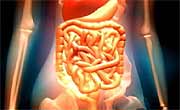- 10 Strategies to Overcome Insomnia
- Could Artificial Sweeteners Be Aging the Brain Faster?
- Techniques for Soothing Your Nervous System
- Does the Water in Your House Smell Funny? Here’s Why
- Can a Daily Dose of Apple Cider Vinegar Actually Aid Weight Loss?
- 6 Health Beverages That Can Actually Spike Your Blood Sugar
- Treatment Options for Social Anxiety Disorder
- Understanding the Connection Between Anxiety and Depression
- How Daily Prunes Can Influence Cholesterol and Inflammation
- When to Take B12 for Better Absorption and Energy
Cutting Certain Carbs Might Not Ease Irritable Bowel Syndrome


There’s little evidence that eliminating certain types of carbohydrates from their diet will benefit people with irritable bowel syndrome (IBS), a new study finds.
The researchers looked at the published studies on a specific diet called the low FODMAP diet. This diet is based on the theory that certain carbohydrates are poorly absorbed by the small intestine and that IBS symptoms worsen when people with the disorder eat these types of carbohydrates.
The types of carbohydrates eliminated in this diet are found in wheat, onions, legumes, milk, honey, apples, high-fructose corn syrup, and the artificial sweeteners sorbitol and mannitol.
Some guidelines suggest that a low FODMAP diet might be appropriate for IBS patients who have had no success with other treatments. But this should only be done under the supervision of a dietitian who specializes in this type of therapy, according to the review published online Aug. 6 in Drug and Therapeutics Bulletin.
“However, we believe that patients should be advised that there is very limited evidence for its use, the ideal duration of treatment has not been assessed in a clinical trial, and its place in the management of IBS has not been fully established,” wrote Dr. James Cave, editor-in-chief of Drug and Therapeutics Bulletin.
The review did find some evidence that patients believe the diet reduces some IBS symptoms. And, one study indicated that the diet alters the bacteria population in the digestive tract, but the implications and long-term effects of that are unclear, the researchers said.
Overall, claims that the low FODMAP diet helps control IBS symptoms are “based on a few relatively small, short-term unblinded or single-blinded controlled trials of varying duration,” wrote Cave.
IBS affects up to 20 percent of people, and women are twice as likely as men to have the disorder, which causes symptoms such as abdominal pain/discomfort, bloating and changes in bowel habits.
More information
The American Academy of Family Physicians has more about irritable bowel syndrome.
Source: HealthDay
Copyright © 2026 HealthDay. All rights reserved.










